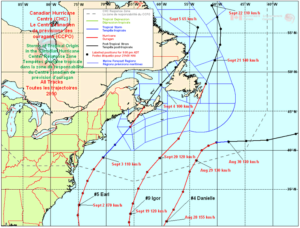Hurricanes in Atlantic Canada

A map of hurricane tracks from Environment Canada
Residents in Atlantic Canada face the threat of up to two tropical systems every other year.
The Maritime Region of Canada is vulnerable to tropical systems, including hurricanes.
Hurricanes, also known as tropical cyclones, are low-pressure weather systems that contained organized thunderstorms. Cyclones with wind-speeds up to 62.7 kilometres per hour are called tropical depressions and storms with winds 62.7 kilometres per hour and more are classified as tropical storms, according to NOAA. Storms with sustained winds more than 119 kilometres per hour are hurricanes.
These rotating storms originate in the Atlantic Basin, which includes the Atlantic Ocean, Caribbean Sea and the Gulf of Mexico. In the tropics, hurricanes are steered by easterly winds known as trade winds which makes them travel west.
These storms are more commonly known as post–tropical systems by the time they make landfall on Canadian soil, mainly in the Maritime provinces. Since 1951, 23 hurricane–strength post-tropical systems have made landfall in Canada according to the Canadian Hurricane Centre. Over the last few years, the average number of hurricanes that have entered Canadian territory have been increasing.
Since 2000 there have been about one land-falling hurricane every other year and one to two storms of tropical origin moving over land each year. From 1951 to 2008, nearly 40 per cent of Atlantic named storms entered the Canadian Hurricane Centre Response zone, and only a quarter of those made landfall.
Ian Hubbard, meteorologist at Environment and Climate Change Canada, said there are reasons tropical systems head this far north.
“The ones that we see that make it up into our area tend to form and push northward and tend to take a north eastward track as they maybe brush or track across one of the Maritimes provinces,” said Hubbard.
Climate change projections suggest that the number of hurricanes will rise. Ocean warming will enable these storms to travel further and may see greater tropical systems impacting the coasts in the future, according to Brett Anderson.
Brett Anderson is a Senior Meteorologist and Canada weather specialist at AccuWeather.com said climate change is a reason for Eastern Canada to be concerned.
“Atlantic waters in general are expected to further warm over the coming decades, which may increase the risk for hurricanes in Atlantic Canada,” said Anderson.
According to Direct Energy.com hurricanes travel inland which means some storms can reach Windsor. Once the storm touches southwestern Ontario and the Great Lakes region they can cause torrential rainfall and winds. In central Canada, Windsor Essex can be affected by gusty winds and torrential rain when hurricanes move across the United States after moving inland from the Gulf of Mexico or the Atlantic Ocean, according to Environment Canada.
Matt Trinter a meteorologist with The Weather Network said that residents have time to prepare for an oncoming storm.
“The good thing is that Atlantic Canada is far from the equator, which means the storms tend to take longer,” said Trinter.
According to Hubbard even as a hurricane is approaching it does not always guarantee that the storm will continue as a hurricane.


